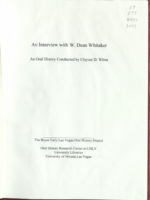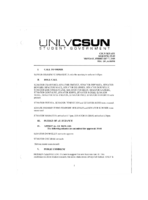Search the Special Collections and Archives Portal
Search Results

Transcript of interview with Ethel S. Hatch by P. Kohlman, November 24, 1975
Date
Archival Collection
Description
On November 24, 1975, collector P. Kohlman interviewed housewife, Ethel S. Hatch (born April 11th, 1914 in Valentine, Texas) in her home in Las Vegas, Nevada. This interview covers the history of Las Vegas from 1939 to 1975. Mrs. Hatch also talks about ranching in Nevada, Rex Bell, development on the Strip, the first hotels, and early local shopping culture. She refers to Block Sixteen as Block Thirteen when discussing the Red Light District. The interview concludes with discussion surrounding tree-lined streets, the Helldorado Club, and Fremont Street.
Text

Transcript of interview with Breck Wall by Claytee White, July 3, 2003
Date
Archival Collection
Description
Breck Wall grew up tough and honed that toughness into solid business acumen. He also grew up talented and that talent took him to movie sets in Los Angeles and allowed him to produce shows in Dallas, New York, Tahoe, and Las Vegas. Though his family became nonexistent early in his life, he formed his own broad family from a group of faithful friends around the country. One special friendship makes this interview worth reading — the one with Jack Ruby. Wall's talent though is the primary reason that this interview is good history. He did many shows and had up to five running simultaneously. The creative process was the fun part that allowed him to produce Passion , Alias, and Night Beat among many others. Bottoms Up is his signature production and has been at several venues in Las Vegas for the past 40 years. Breck Wall is living a full and interesting life. A good example is a phone call from The London Times'. "Mr. Wall?" 1 said, "Yes." He said, "Are you aware that your best friend, Jack Ruby, just shot Oswald?" I said, "What" I was in shock. I said, "No I'm not." And I talked to him very briefly,and I hung up the phone." The phone continued to ring as calls came in from the Dallas Morning News, The Washington Post, The New York Times, etc, etc.
Text

Transcript of interview with Dean Whitaker by Claytee White, April 5, 2010
Date
Archival Collection
Description
William Dean Whitaker was born in 1925 and raised in a suburb of Los Angeles, California. Dean, as he is known, talks briefly about his parents and his brothers, for his youth quickly ended when he joined the Air Force and became an aviation cadet once he had turned 18 years old. The year was 1943 and World War II was raging. He became a member of the 398 th Bomb Group and flew twenty missions before being captured by the Germans. In this oral history, Dean talks with vivid recollection of the day he was captured and details of being a POW in Germany. Among his anecdotes are those of his mother's unwavering belief that he would return home, the humanity of a German soldier, and of meeting Gen. George Patton. Included are photos and excerpts from his personal history of his life during the war. Dean and his wife Lucille moved to Las Vegas in 1990.
Text

Gene Leavitt interview, February 28, 1979: transcript
Date
Archival Collection
Description
On February 28, 1979, collector Monte Leavitt interviewed Gene Leavitt (born October 6th, 1923 in Mesquite, Nevada) at his home in North Las Vegas, Nevada. In this interview, Mr. Leavitt talks about his career as a truck and bus driver. He also talks about the life in Southern Nevada, the soldiers stationed here, and gambling.
Text

Rena Lees interview, March 19, 1978: transcript
Date
Archival Collection
Description
On March 19, 1978, collector Bill Young interviewed Rena Lees (born October 15th, 1934 in Las Vegas, Nevada) at her home in Las Vegas, Nevada. In this interview, Rena Lees talks about growing up in Las Vegas and the activities she was involved in as a teenager. She also discusses her family and her career working at Sunrise Hospital.
Text

Mary Leo interview, February 27, 1980: transcript
Date
Archival Collection
Description
On February 27, 1980, Rafael Reyes-Spindola interviewed Mary Leo (b. Mary Susanne Kaime Leo in 1949 in Santa Barbara, California) about her life growing up in the Las Vegas Valley and her varied career path. Leo, having moved to Las Vegas as a toddler, talks about what the city was like when she arrived, the landscape, schooling and local life in general. She remembers the construction of the University of Las Vegas, Nevada and the growth of the city and population. Through her anecdotes, Leo shares the local attitude towards the Strip that Las Vegans develop as a result of being raised in the city and focuses the beginning half of her interview on life outside of the Strip. The interviewer and Leo move their conversation towards her career path, beginning in a coffee shop at the Riviera Hotel & Casino, her time in the travel industry, as a Las Vegas showgirl in the famed Folies Bergere show, her return to the Riviera as the director of sales and catering, and the legacy she hopes to leave behind with her career.
Text

Rosamond McDougal interview, February 14, 1979: transcript
Date
Archival Collection
Description
On February 14, 1979, Concepcion Fernandez interviewed Rosamond McDougal (born in Texas) about her life as a teacher in Las Vegas. McDougal speaks primarily about her time as a teacher in the Clark County School District, her unique class setup and the district’s changes. Moreover, McDougal speaks about the growing number of students and teachers, the superintendent’s role in bond issues, the courses offered, racial integration in the school district (and the casinos), and the building of the University of Nevada, Las Vegas. McDougal gives personal anecdotes about her family, her husband’s job at the Atomic Test Site and her time as an organ player in churches around the city. Lastly, she talks about recreational activities, Helldorado, the casinos and department stores.
Text

Interview with James Arnold Hodges, January 17, 2005
Date
Archival Collection
Description
Text

Interview with Luciano Acevedo Lopez, July 8, 2004
Date
Archival Collection
Description
Text

Meeting minutes for Consolidated Student Senate, University of Nevada, Las Vegas, February 07, 2005
Date
Archival Collection
Description
Text
